“…. And it was the first time he’d ever seen the sea…”
This is what I remember from the University’s evaluation of holiday clubs I once ran. I’ve long forgotten the academic’s impressive statistics – her pages of scientific proof of the equitable benefits of those holiday clubs – it is just this anecdote that endures. And it is my imagination of the child’s face when he first saw the shoreline that helps me explain why in London – as well as in my new home of Scotland – professionals, volunteers and carers are so keen to help these clubs.
However, as vital as enthusiasm and goodwill are, these traits will only get us so far. Me? I’d change loads of what I did. And, as I find out more about what others do in the planning of their holiday programmes, I learn that my missteps are common missteps. That doesn’t seem right. After all, lessons are to be shared. This blog outlines my thoughts on how community and public assets can be best harnessed in the running of holiday clubs. These reflections on my past experience have been triggered by meetings with many of Scotland’s community food initiatives and Scotland’s launch of the Children’s Future Food Enquiry in May 2019.
Three things I learnt in England:
1. Holiday programmes should use the ‘whole system’
Who better to provide safe and edifying care than the people who have established relationships within a community: youth workers, teachers, sports coaches, cooking teachers, lifeguards or librarians? Who better to promote holiday clubs than a child’s own school, or their family’s GP, social prescriber, housing association, social workers, community policing team, advocate, case worker, welfare advisor or food bank? Who can provide the affordable and attractive venues better than the local school, youth club, community centre, library, leisure centre, park, community café, or anchor organisation? Where else to turn for healthy food than a local caterer, food cooperative, school kitchen, community cafe, community-minded businesses or – indeed – the children’s own cheffing talents?
With all these possible local assets, it’s obvious why a single person, team, or organisation shouldn’t run a holiday programme all by themselves. If a holiday programme is really going to improve a child’s health, their ability to learn, or their lifetime aspirations, many more people are needed in the planning process. Thankfully, the great thing about a holiday programme is that the people desirable for the planning are, almost without exception, keen to be in the planning room. After all, are many of us so fortunate to regularly work on such immediately rewarding projects?
2.‘Whole system’ holiday programmes need formal partnerships
So, let’s assume most of the people listed above are willing to help out. Now what? By their very nature, the diverse collaborations best able to devise holiday programmes share no formal authority. And yet, at some point, for them to run successfully, someone needs to make decisions. In my first year running these clubs, as the person trusted with the programme’s budget, I thought I could play this role. I was wrong. Charm, hard work and good luck just about helped us to scrape through. Nevertheless, by the second year, I had learnt valuable lessons in collaborative governance and we put in place a formal planning partnership underpinned by transparent agreements.
My choices as to how to spend scarce funding that year necessarily denied many would-be collaborators their role in the holiday programme. I believe my decisions that first year offered our area’s children the best quality, safest, most reliable, scalable, accessible, healthy and affordable activities. But that’s almost beside the point. What should have been paramount for sustainability is that the community and my collaborators had faith in the decision making process. When working within the whole system, this faith is difficult for one self-appointed lead institution to achieve – let alone one individual. It wasn’t hard for any dejected would-be collaborators to perceive a conflict of interest. And in many ways, they were right. After all, as much as I tried to avoid these, to what extent did trivialities including professional congeniality, budget shortfalls and ease of procurement subtly influence my decisions?
By the second year, we’d set up our areas . This new coalition provided our area’s holiday programme the best governance mechanism available. By running planning decisions through the partnership we achieved a high degree of legitimacy within the community. After all, the Partnership had established a robustness through its broad membership, its elected chair person, its independent coordinator, its co-produced strategy and its multi-sector steering group.
3. Partnerships need minimum standards
Simply put – because there will always be someone who frivolously suggests that they be funded to give away (redistributed) food at their annual festival – the planners of a holiday programme need to consider exactly what they’re trying to achieve. In our area, it wasn’t felt useful, or dignified, to provide semi-stale buns to the frequenters of one-off events. We had bolder ambitions for our holiday clubs. We wanted to both reduce inequalities in children’s education and health. As a result, our holiday programme needed to be made up of free, fun, inclusive, edifying and catered activities.
Therefore, we put out a funding call to all appropriate collaborators indicating our intention to fund a fixed number of clubs by any number of providers so long as they provided at least three hours of safe, fun, edifying and catered activity per day, for at least four days per week during the school holidays. We ran a competition adjudicated by our Partnership’s Board and honoured by one of our Member’s grant giving capabilities. Our Food Partnership favoured the best value applications. However, we made explicit provisions to accept more costly proposals providing they could be shown to build productive relationships between organisations, develop new skills within communities or appeal to groups of children not yet catered for by the overall programme. The quality of bids we received was unprecedented. For example, some of the collaborative arrangements proposed between leisure centres and coops, third sector and libraries surpassed our imagination.
I have listed the three ways my approach to planning holiday clubs improved over the two years I helped run them. For me, collaborative, rule-based partnerships will become a key feature of best holiday programmes. However, these three measures are not a recipe for success. I was far from cracking this. Indeed, my final year running these collaborations had its own problems. The biggest of which, in my opinion, was the fact that decisions as to what would benefit children the most were still being made exclusively by rooms of (mostly white collared) adults.
Something to learn in Scotland:
1. Participatory Budgeting
Despite of all the efforts we’d made to democratise the planning of holiday programmes, no matter how detailed our bureaucracy, we did not save ourselves from perversity of deciding whether children from low income families would prefer a week’s music production course or a theatre workshop; whether they’d prefer 10 free spaces on an outdoor pursuits retreat, versus 120 free spaces on a lunch club within their school buildings. As I’ve been getting to know the community planning infrastructure in Scotland, I have started to wonder whether participatory budgeting may help solve this issue and thereby add a valuable dimension to the planning of holiday programmes.
It seems intuitive to me that the best way to plan a summer programme would be with the children and families that the professionals are most keen to see attend. Giving them a chance to decide how funds are spent could be game changing. I have yet to hear of a Council that’s included its holiday provision in its participatory budgeting. And yet, I hope we learn from the first that does.
In conclusion, tax funded, catered holiday clubs – free at the point of use – are needed across Scotland to prevent the school holidays being a source of childhood inequality. With practice, we’ll get the best from these clubs. Nevertheless, for the time being, there remains unanswered questions about the best ways to run them. I hope that my first-hand experience, limited though it is, provokes your thoughts. Get in touch if you know better. If there’s interest, I’d like to help the proper experts create a more systematic account of how (and who) should organise and run these clubs.
With thanks to those in North Lanarkshire and Edinburgh who helped me understand how their areas have been running holiday clubs in recent years.
francis.eatwell-roberts@nhs.net

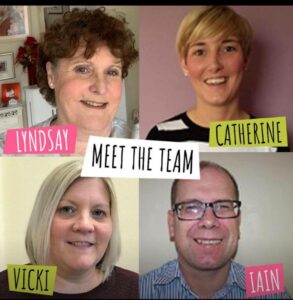 Lyndsay Clark from the Feeding Fifers team tell us what they have learnt from putting cooking skills work online:
Lyndsay Clark from the Feeding Fifers team tell us what they have learnt from putting cooking skills work online: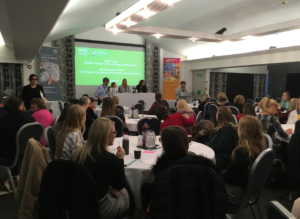 Thanks to all who attended our annual networking event, Hear Say, on
Thanks to all who attended our annual networking event, Hear Say, on 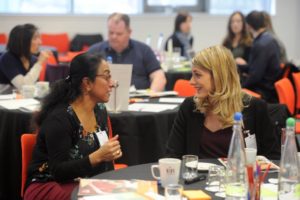 oking activities.
oking activities.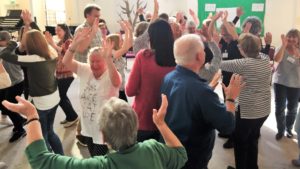 ‘Take
‘Take 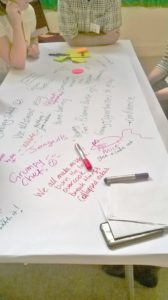
Showcasing the importance of the community food sector
Join us as we highlight how community food initiatives build local partnerships to collectively make a difference.
In this webinar, Community Food Initiatives North East (CFINE) and Lanarkshire Community Food and Health Partnership (LCFHP) will discuss how their work makes a difference to their local communities by improving access to affordable, sustainable and nutritious food, tackling poverty and building resilience.
Thursday 29 May 2025
11 am – 12 pm
Online via Teams
They’ll share tips and ideas on how they’ve established links with local partnerships, local food systems and other networks. There will be time for questions and discussion.
This is the first in our series of online sessions that aims to bring people together to collectively build a stronger community food sector in Scotland. If you are planning to get involved in shaping future Good Food Nation Plans or are a community food initiative who would like to learn from others, then this learning session is for you.
Register on the Eventbrite website.
Please contact Kim Newstead phs.cfhs@phs.scot if you would like to contribute to future sessions.
You can read case studies on the Public Health Scotland website about how CFINE and LCFHP contribute to addressing health inequalities.